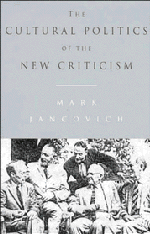Book contents
- Frontmatter
- Contents
- Preface
- List of abbreviations
- Part I The New Criticism and its critics
- Part II The formation of the New Criticism
- Part III The establishment of the New Criticism
- Part IV The development of the New Criticism
- Introduction
- 10 John Crowe Ransom: the isolation of aesthetic activity
- 11 Allen Tate: the man of letters and the cold war
- 12 Robert Penn Warren: literature and social engagement
- Conclusion: Modernism and postmodernism within the American academy
- Conclusion
- Notes
- Bibliography
- Index
12 - Robert Penn Warren: literature and social engagement
Published online by Cambridge University Press: 18 December 2009
- Frontmatter
- Contents
- Preface
- List of abbreviations
- Part I The New Criticism and its critics
- Part II The formation of the New Criticism
- Part III The establishment of the New Criticism
- Part IV The development of the New Criticism
- Introduction
- 10 John Crowe Ransom: the isolation of aesthetic activity
- 11 Allen Tate: the man of letters and the cold war
- 12 Robert Penn Warren: literature and social engagement
- Conclusion: Modernism and postmodernism within the American academy
- Conclusion
- Notes
- Bibliography
- Index
Summary
Introduction
During the late 1940s and early 1950s, Warren developed a type of liberalism in his social and cultural criticism, but this liberalism was not an uncritical assessment of American society, or a form of asocial formalism. It drew directly upon his Agrarian positions of the late 1920s and 1930s. The term ‘liberalism’ is a complex one which covers many different and diverse positions. This is particularly so in the South where, as Comer Vann Woodward has pointed out, the term has been used to describe both the New South school of Henry Grady, and the positions of Warren and Woodward himself – despite the fact that these latter positions were directly opposed to those of the former. In the South, the term ‘liberalism’ has been used to describe both an uncritical and optimistic promotion of industrial progress, which called for a reconciliation between classes and races under an anti-populist, white rule; and the critical, populist, and anti-racist positions developed by writers such as Woodward and Warren. The term ‘liberalism’ was further complicated by the rise of post-war liberalism in the 1940s and 1950s. This was a complex movement which embodied many diverse and contradictory elements, but it has often been accused of an uncritical and over-optimistic assessment of the American economy and society, and of the possibilities of reconciliation and consensus within them. This may be true as a general criticism, but it is important to note that post-war liberalism incorporated many elements to which these criticisms do not apply. The case of Warren is an example. He not only countered the complacency present in much American liberalism, but presented literature as a critical engagement with its social context.
- Type
- Chapter
- Information
- The Cultural Politics of the New Criticism , pp. 124 - 136Publisher: Cambridge University PressPrint publication year: 1993



